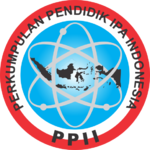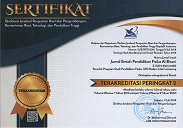Mobile Phone Utilization for Learning: Physics Teachers' Perception
Abstract
Keywords
Full Text:
PDFReferences
Ahmed, S., & Parsons, D. (2013). Abductive Science Inquiry using Mobile Devices in The Classroom. Computers and Education, 63, 62–72. https://doi.org/10.1016/j.compedu.2012.11.017
BSNP. (2010). Pengembangan Paradigma Pendidikan Nasional Abad XXI. Retrieved from http://www.bsnp-indonesia.org/id/wp-content/uploads/2012/04/Laporan-BSNP-2010.pdf
Chen, C. M., Liu, H., & Huang, H. Bin. (2019). Effects of a Mobile Game-Based English Vocabulary Learning App on Learners’ Perceptions and Learning Performance: A Case Study of Taiwanese EFL Learners. ReCALL, 31(2), 170–188. https://doi.org/10.1017/S0958344018000228
Curran, V., Gustafson, D. L., Simmons, K., Lannon, H., Wang, C., Garmsiri, M., … Wetsch, L. (2019). Adult Learners’ Perceptions of Self-Directed Learning and Digital Technology Usage in Continuing Professional Education: An Update For The Digital Age. Journal of Adult and Continuing Education, 25(1), 74–93. https://doi.org/10.1177/1477971419827318
El-Hussein, M., Osman, M., & Cronje, J. C. (2010). Defining Mobile Learning in the Higher Education Landscape. Journal of Educational Technology & Society, 13(3).
Hsieh, W. M., & Tsai, C. C. (2017). Taiwanese High School Teachers’ Conceptions of Mobile Learning. Computers and Education, 115, 82–95. https://doi.org/10.1016/j.compedu.2017.07.013
Ishak, G. A., Astra, I. M., Permana, A. H., Azizah, N., Widyanirmala, W., & Nugraha, A. (2014). Pengembangan Media Cerita Gelombang Elektromagnetik Melalui Mobile Learning Dengan Sistem Operasi Android. Prosiding Seminar Nasional Fisika, 57–61.
Khan, R. M. I., Radzuan, N. R. M., Alkhunaizan, A. S., Mustafa, G., & Khan, I. (2019). The Efficacy of MALL Instruction in Business English Learning. International Journal of Interactive Mobile Technologies, 13(8), 60–73.
Makoe, M., & Shandu, T. (2018). Developing a Mobile App for Learning English Vocabulary In An Open Distance Learning Context. International Review of Research in Open and Distance Learning, 19(4), 208–221. https://doi.org/10.19173/irrodl.v19i4.3746
Mendez, D., Mendez, M., & Anguita, J. (2018). Motivation of 14 year-old Students using Tablets, Compared to Those using Textbooks and Workbooks. International Journal of Interactive Mobile Technologies, 12(4), 86–96. https://doi.org/10.3991/ijim.v12i4.9203
Mendez, D., & Slisko, J. (2013). Software Socrative and Smartphones as Tools for Implementation of Basic Processes of Active Physics Learning in Classroom: An Initial Feasibility Study with Prospective Teachers. European Journal of Physics Education, 4(2), 17-24
Mohammad, M. A. H. (2017). Mobile Applications’ Impact on Student Performance and Satisfaction. The Turkish Online Journal of Educational Technology, 14(4), 102–112.
Mughal, N. A., Atkins, E. R., Morrow, D., & Al-Jundi, W. (2018). Smartphone Learning as an Adjunct to Vascular Teaching - A Pilot Project. BMC Medical Education, 18(1), 1–6. https://doi.org/10.1186/s12909-018-1148-8
Njenga, S., Oboko, R., Omwenga, E., & Maina, E. (2018). Facilitating Group Learner Participation using Intelligent Agents in Collaborative M-Learning. 2018 IST-Africa Week Conference, IST-Africa 2018, 1.
Pujiastuti, H. (2018). Interactive Teaching Materials Based on Scientific Approach: Triangles and Quadrilaterals. SHS Web of Conferences, 42, 00097. https://doi.org/10.1051/shsconf/20184200097
Taufik, M., & Kristanto, A. (2018). Pengembangan Mobile Learning Berbasis Aplikasi Android Mata Pelajaran Fisika Materi Listrik Arus Searah Kelas XI SMK Negeri 2 Kediri. Jurnal Mahasiswa Teknologi Pendidikan, 9(2), 1–8.
Thinley, P., Reye, J., & Geva, S. (2014). Tablets (iPad) for M-Learning in the Context of Social Constructivism to Institute an Effective Learning Environment. International Journal of Interactive Mobile Technologies, 8(1), 16–20. https://doi.org/10.3991/ijim.v8i1.3452
Thomas, K. M., O’Bannon, B. W., & Britt, V. G. (2014). Standing in the Schoolhouse Door: Teacher Perceptions of Mobile Phones in The Classroom. Journal of Research on Technology in Education, 46(4), 373–395. https://doi.org/10.1080/15391523.2014.925686
Wang, W., Ran, S., Huang, L., & Swigart, V. (2019). Student Perceptions of Classic and Game-Based Online Student Response Systems. Nurse Educator, 44(4), E6–E9. https://doi.org/10.1097/NNE.0000000000000591
Zhai, X., Zhang, M., Li, M., & Zhang, X. (2019). Understanding the Relationship Between Levels of Mobile Technology use in High School Physics Classrooms and The Learning Outcome. British Journal of Educational Technology, 50(2), 750–766. https://doi.org/10.1111/bjet.12700
DOI: http://dx.doi.org/10.24042/jipfalbiruni.v8i2.4840
Refbacks
- There are currently no refbacks.

Jurnal ilmiah pendidikan fisika Al-Biruni is licensed under a Creative Commons Attribution-ShareAlike 4.0 International License.
![]()







